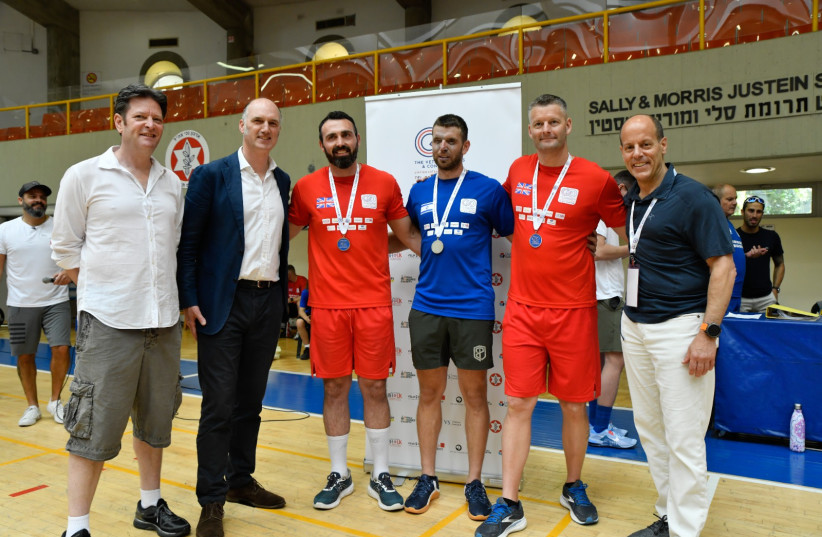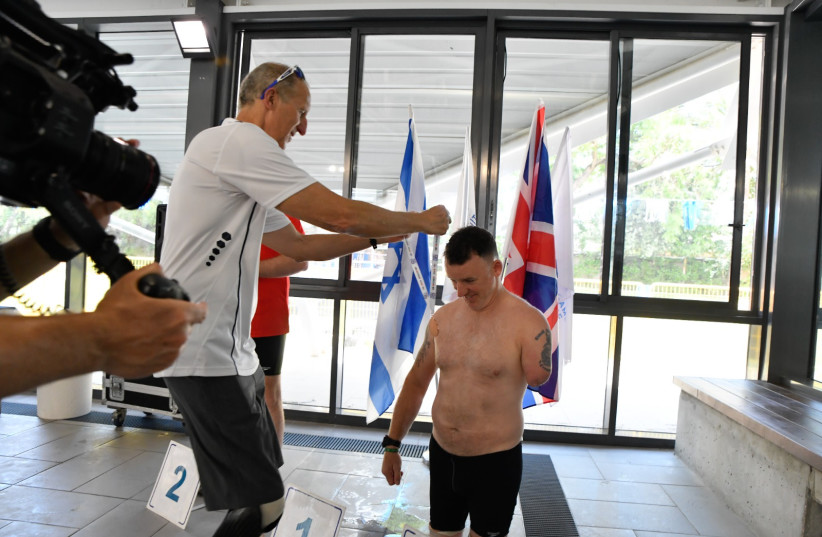Close to 200 disabled British military veterans are in Israel this week, competing against disabled IDF veterans in a number of sporting events in the fourth annual Veteran Games.
The five-day-long games hosted by the IDF Disabled Veterans’ Organization and Beit Halochem UK (BHUK – Warrior's House) took place in Tel Aviv at rehabilitation centers run by the Beit Halochem charity and saw participants compete, try new sports and, during a conference on PTSD, learn about how their respective countries provide specialized care for those injured in combat.
Many of the British competitors had never been to Israel, so along with the sporting events, the participants also went on cultural tours of Israel and visited Jerusalem and the Dead Sea as well as spent the day at the beach in Tel Aviv.
Spencer Gelding is the chief executive of Beit Halochem UK – which, according to its website, provides "exceptional rehabilitative services and life-long care for our brave veterans and their families." He told The Jerusalem Post that the idea of putting together such a competition came after he was told by the British defense ministry that Beit Halochem could not participate since Israel had no combat soldiers in Afghanistan or Iraq.
“But when one door closes, another one opens and we put together our own games.”
Spencer Gelding, chief executive of Beit Halochem UK
"I have a strong belief in helping the British community, but I’m a Zionist and I have been involved with working with Israel,” he said. “One of our failings was not working enough in the non-Jewish community to promote Israel. I wanted to create those strong ties and try to enhance the love of Israel in people who had no knowledge of the country except what they see in the media.”

The families of the 60 UK veterans along with British academics also came to Israel," Gelding said. “Almost all are new to Israel, most had little to no knowledge of the country other than what they see in the media.
He explained that the focus of the games was healthy competition and cultural tours.
While politics was not welcome, the UK's Minister of Defense People and Veterans Leo Docherty MP, flew to Israel for the games because he wanted to see and learn in order to bring back ideas.
British veteran thankful for Veteran Games
David Wiseman was commissioned from the Royal Military Academy Sandhurst as an infantry officer and commanded troops in both Iraq and Afghanistan.
In 2009 he was serving in the Helman province and was conducting a fighting patrol when he engaged in advanced contact with enemy fighters. During the firefight, he was hit in the chest and the round entered just below his collarbone before entering his lung, where it remains until this day.
The bullet ended his military career at the rank of captain.
Wiseman explained that it was a “long and complicated recovery process” and he spent a long time in hospital and in a rehabilitation center.
“Alongside my standard recovery process with army medical services, I took it upon myself to accelerate my recovery with sport,” Wiseman said, explaining that he used sports “as a vehicle and catalyst” for his recovery.
He took up regular and high-altitude mountaineering and swimming.
It was Wiseman’s first time in Israel and he competed in the 50 freestyle and 50 breaststroke along with water polo.
“For me, sport was an incredible process for my recovery and it was incredible to see at the Veteran Games. It switches the lights back on for veterans whose lights have been dimmed because of their experiences,”
David Wiseman, British Armed Forces veteran
Wiseman explained that following his injury, he had “a lot of intrusive thoughts” and a “busy mind that never switched off.”
Being in the water, however, “you are fully immersed so all the sounds are muffled and your sights are controlled and you have to concentrate on your breathing and the position of your body. There is very little else your mind can do except to meditate," he said.
“I always liked to compete – soldiers are competitive by their very nature," the UK veteran said. "And to go up against someone from another country is a privilege. When it came to water polo, we mixed the teams up so we were international teams and competing alongside each other and not against.”
Israel he said, “was fantastic; it’s a country I've always wanted to visit. It’s rich in culture and history, and it's really interesting for me.”
Wiseman told the Post that he never met Israelis while he was serving, and outside the competition, he had an amazing experience with the Israeli veterans.
He shared that during the games he met an Israeli in his early 20s who had been shot very recently in a very similar location.
“We compared scars on our chest and shoulders,” he said.
Wiseman explained that after he was shot, he was paralyzed on his right side.
“The same thing happened to this man, who was concerned about his nerve damage. I was showing him that while my hand is not 100%, it came back over the years. And that gave him hope,” he said.
“I think that this week has brought people together and allowed that osmosis of knowledge and experience sharing so people know that they aren't alone.”

Foundations, organizations invest in Veteran Games
The Veteran Games and the conference on mental health were funded by philanthropic donations and supported by leading rehabilitation and forces organizations including the Royal Marines Charity, RAF Benevolent Fund, Rock to Recovery, Veteran Scotland, Combat Stress, the Not Forgotten Association and the Association of Jewish ex-Service Men and Women (AJEX).
The entire program is funded by donations from the Patron Charitable Initiatives, the Pears Foundation, Rachel Charitable Trust, the Maurice Wohl Charitable Foundation, the Charles Wolfson Charitable Trust, and the Exilarch’s Foundation.
The Chelsea Foundation is also backing the event by providing football coaching for attending families and specialist workshops for Israeli sports teachers.
